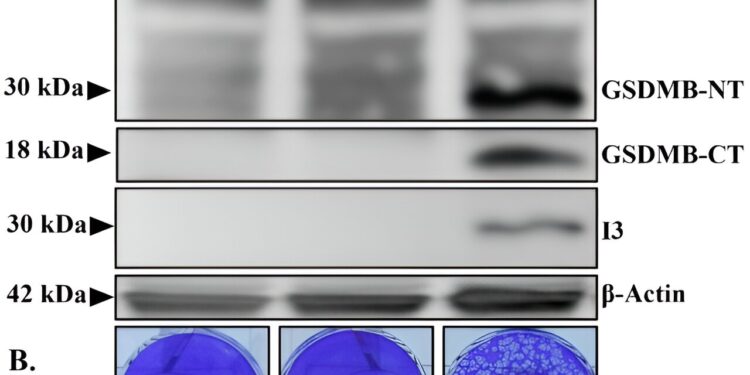Effect of thermal inactivation (HI) on the infectivity of MPXV. A) Human astrocytes were infected with HI or non-inactivated MPXV at an MOI 10 for 24 hours. B) The number of infectious particles in Mock, HI MPXV, and MPXV was determined by plaque assay in BSC-40 cells. Credit: Proceedings of the National Academy of Sciences (2024). DOI: 10.1073/pnas.2315653121
A multidisciplinary team from the University of Alberta is seeking to understand how the monkeypox virus (mpox) may cause neurological symptoms in people affected by the global outbreak of mpox disease, declared by the World Health Organization. health in 2022.
In research recently published in the journal Proceedings of the National Academy of Sciences, the team used laboratory experiments to infect human brain cells with the mpox virus. They found that the mpox virus infiltrated astrocytes – a type of cell responsible for normal brain function – triggering an extreme immune response.
“Astrocytes are the most abundant neural cells in the brain,” says first author Hajar Miranzadeh Mahabadi, a postdoctoral medical researcher and Canadian Institutes of Health Research HIV Trials Network fellow. “We found that the monkeypox virus can effectively infect these cells and cause a kind of brain cell death that we call pyroptosis.”
“We are studying the potential of the virus to infect brain cells and what consequences that infection might have on the cells,” said co-investigator Ryan Noyce, assistant professor of medical microbiology and immunology, noting that a more Further investigation is needed using samples from human patients, animal models, and various strains of mpox. “Our results highlight the possibility that monkeypox virus infiltrates the brain and infects cells in some cases.”
Understanding a global epidemic
According to Health Canada, more than 80,000 people had been infected with the mpox virus by the time the outbreak was declared, and there are currently approximately 1,500 confirmed cases in Canada. The virus is transmitted by skin contact, sexual contact or respiratory droplets, and this epidemic has mainly affected men who have sex with men.
Common symptoms include rash, fever and muscle pain, but neurological symptoms such as headache, mental confusion and seizures have been increasingly observed, suggesting inflammation of brain tissue.
“The magnitude of monkeypox virus cases, particularly those associated with neurological complications, has highlighted the urgent need to understand the potential effect of monkeypox virus on the central nervous system,” explains Miranzadeh Mahabadi, emphasizing that this is the first study examining brain cells exposed to mpox virus.
The research team identified a potential avenue for treatment when they successfully reduced cell death in mpox virus-infected cells by treating them with dimethyl fumarate, a compound approved in Europe for psoriasis and used to treat multiple sclerosis in the United States and Canada.
Noyce notes that there are now two approved antiviral treatments for mpox disease and there is also a vaccine available in Canada to prevent the disease in vulnerable populations.
Miranzadeh Mahabadi plans to continue her research on mpox and the brain and examine why mpox disease appears to be more severe and has a higher mortality rate in people who are also HIV positive.
More information:
Hajar Miranzadeh Mahabadi et al, Monkeypox virus infection of human astrocytes causes gasdermin B cleavage and pyroptosis, Proceedings of the National Academy of Sciences (2024). DOI: 10.1073/pnas.2315653121
Provided by University of Alberta
Quote: Researchers study how the mpox virus infiltrates brain cells (February 16, 2024) retrieved February 16, 2024 from
This document is subject to copyright. Apart from fair use for private study or research purposes, no part may be reproduced without written permission. The content is provided for information only.



